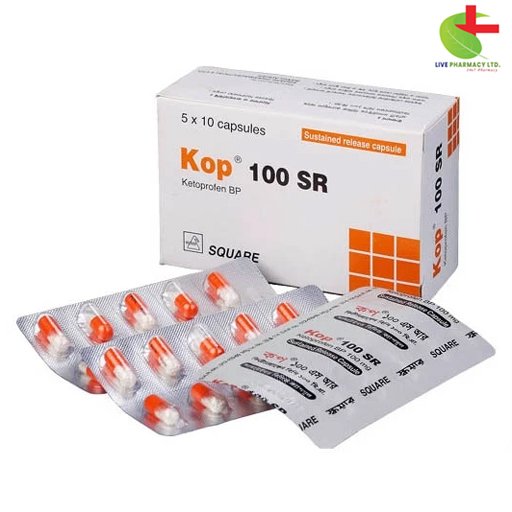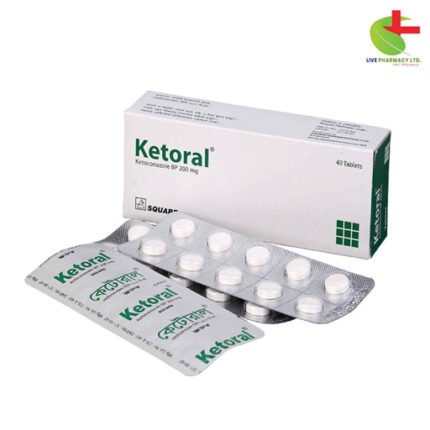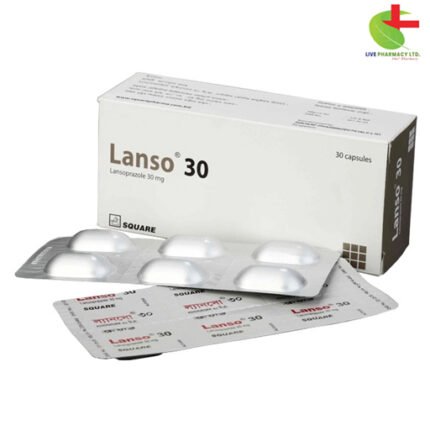Kop 100 SR
110.30৳ Strip
- Discover relief with Ketoprofen, a trusted NSAID offered by Live Pharmacy.
- Effectively manage rheumatoid arthritis, musculoskeletal disorders, and pain with Ketoprofen’s potent anti-inflammatory properties.
- Experience comprehensive symptom relief as Ketoprofen targets inflammation, pain, and fever.
- Receive expert dosage guidance and essential precautions for safe and effective administration from Live Pharmacy.
- Prioritize your well-being and achieve optimal therapeutic outcomes with Ketoprofen from Live Pharmacy.
 Brand
Brand
|
Square Pharmaceuticals PLC |
|---|---|
 Generics
Generics
|
Ketoprofen |
Indications
Ketoprofen demonstrates effectiveness in alleviating symptoms stemming from its anti-inflammatory, analgesic, and antipyretic properties. It is prescribed for the following conditions:
- Rheumatoid arthritis
- Degenerative joint diseases
- Various musculoskeletal and joint disorders such as tendinitis and sprains
- Pain management, encompassing dental pain, headaches, and primary dysmenorrhea.
Pharmacology
Ketoprofen, a non-steroidal anti-inflammatory drug (NSAID), exerts analgesic and antipyretic effects. Apart from inhibiting prostaglandin synthesis, it stabilizes lysosomal membranes both in vitro and in vivo. Ketoprofen also demonstrates inhibition of leukotriene synthesis at higher concentrations and exhibits antibradykinin activity. Its analgesic action stems from peripheral and central prostaglandin synthesis inhibition, potentially involving the suppression of prostaglandin synthesis in the central nervous system (CNS), particularly in the hypothalamus.
Upon oral administration, ketoprofen is rapidly and almost completely absorbed from the gastrointestinal tract. It binds extensively to plasma proteins, predominantly albumin. Metabolism occurs primarily in the liver via glucuronidation. The drug’s elimination half-life typically ranges from 1.1 to 4 hours in healthy adults, with excretion primarily occurring through urine (50-90%) and feces (1-8%).
Dosage
For anti-inflammatory purposes, the initial recommended dosage is 150 to 300 mg/day in three divided doses. Once maintenance dosage is determined (usually 100 to 200 mg/day), a twice-daily regimen may be attempted. Alternatively, transitioning to once-daily administration at the same dosage could be considered, with a maximum daily dose of 300 mg.
For pain management and primary dysmenorrhea, the usual recommended dose ranges from 25 to 50 mg, administered every 6 to 8 hours as needed, not exceeding a total daily dose of 300 mg.
Administration
Oral forms should be taken with fluids, preferably alongside food.
Interactions
Ketoprofen is not recommended for concomitant use with other NSAIDs, including cyclooxygenase-2 selective inhibitors, and high-dose salicylates due to an increased risk of gastrointestinal ulceration and bleeding. Close monitoring is advised if coadministration cannot be avoided.
Other interactions include:
- Increased risk of bleeding when coadministered with anticoagulants such as heparin, vitamin K antagonists (e.g., warfarin), platelet aggregation inhibitors (e.g., ticlopidine, clopidogrel), thrombin inhibitors (e.g., dabigatran), or direct factor Xa inhibitors (e.g., apixaban, rivaroxaban, edoxaban).
- Potential elevation of lithium plasma levels, necessitating close monitoring and potential dosage adjustments during and after NSAID therapy.
- Increased risk of haematologic toxicity with methotrexate at doses exceeding 15 mg/week, particularly if administered at high doses (>15 mg/week).
- Enhanced risk of hyperkalemia when coadministered with drugs known to promote hyperkalemia, such as potassium salts, potassium-sparing diuretics, ACE inhibitors, angiotensin II antagonists, NSAIDs, heparins, cyclosporin, tacrolimus, and trimethoprim.
- Decreased antihypertensive potency when coadministered with antihypertensive agents (beta-blockers, ACE inhibitors, diuretics) due to inhibition of vasodilator prostaglandins by NSAIDs.
- Increased risk of gastrointestinal bleeding when used concomitantly with selective serotonin reuptake inhibitors (SSRIs).
Contraindications
Ketoprofen is contraindicated in patients with a history of hypersensitivity reactions to ketoprofen, aspirin (ASA), or other NSAIDs. It is also contraindicated in individuals with:
- Severe heart failure
- Active or history of peptic ulcer/hemorrhage
- History of gastrointestinal bleeding or perforation related to previous NSAID therapy
- Severe hepatic or renal insufficiency
- Third trimester of pregnancy
- Rectitis or history of proctorrhagia (rectal administration)
Side Effects
Side effects associated with ketoprofen may include various disorders affecting different organ systems. Common adverse reactions encompass gastrointestinal disturbances such as dyspepsia, nausea, and abdominal pain. Other possible side effects range from hematologic disorders to skin and subcutaneous tissue reactions.
Pregnancy & Lactation
Ketoprofen is not recommended during the first and second trimesters of pregnancy due to insufficient safety data. It is contraindicated in the third trimester and not recommended for nursing mothers.
Precautions & Warnings
Special precautions should be taken in patients with gastrointestinal diseases, renal impairment, or abnormal liver function. Caution is advised in individuals with hypertension, congestive heart failure, or those at risk of fluid retention. NSAIDs like ketoprofen may mask signs of infection, and careful monitoring is warranted in cases of visual disturbances, liver function abnormalities, and infertility issues.
Use in Special Populations
- Elderly: Initiate treatment with reduced dosages and maintain patients on the minimal effective dose.
- Hepatic Impairment: Monitor hepatically impaired patients closely and administer the minimal effective daily dosage.
- Renal Impairment: Initiate treatment with reduced dosages and maintain patients on the minimal effective dose.
Overdose Effects
Overdose cases involving ketoprofen up to 2.5 g have been reported, typically resulting in benign symptoms such as lethargy, drowsiness, nausea, vomiting, and epigastric pain. Symptomatic and supportive treatment is recommended, including gastric lavage in suspected massive overdoses. Monitoring for dehydration, urinary excretion, and correction of acidosis, if present, is advised. In cases of renal failure, hemodialysis may be beneficial.
Therapeutic Class
Ketoprofen belongs to the therapeutic classes of drugs for osteoarthritis, drugs used for rheumatoid arthritis, and non-steroidal anti-inflammatory drugs (NSAIDs).
Storage Conditions
Store ketoprofen away from light at temperatures below 30°C. Ensure usage before the expiration date and keep all medicines out of the reach of children. Dispense only upon the prescription of a registered physician.













Reviews
There are no reviews yet.